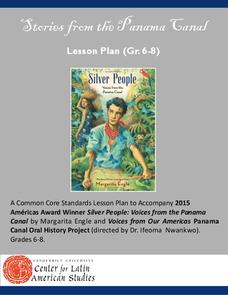Channel Islands Film
Island Rotation: Lesson Plan 2
Why are Torrey pines only found in La Jolla, California and on Santa Rosa Island? Class members examine images of Torrey pines from these two locations, noting the similarities and differences, and then develop a demonstration model that...
Prestwick House
Analyzing Multiple Interpretations of Literature
There is a reason why an Oscar is given each year for the Best Adaptation Screenplay. Adaptations are the focus of an exercise that asks class members to compare a work of literature with a least one adaptation of the work into a...
Illinois Mathematics and Science Academy
A Search for Symbolism in The Great Gatsby
After reading The Great Gatsby, groups return to the text and note passages where Fitzgerald uses symbols and color imagery in his narrative. They then develop a presentation that explains the context, the implications, and possible...
Vanderbilt University
Stories from the Panama Canal
The stories of the Silver People, the West Indies immigrants hired to work on the Panama Canal, come to life in a lesson about the building of the Panama Canal. Groups research why the canal was built, how it was build, the working...
Albert Shanker Institute
Economic Causes of the March on Washington
Money can't buy happiness, but it can put food on the table and pay the bills. The first of a five-lesson unit teaches pupils about the unemployment rate in 1963 and its relationship with the March on Washington. They learn how to create...
Curated OER
Conservation at a Crossroads Lesson 1: What Is Conservation and Why Does It Matter?
High schoolers explore the concept of conservation. In this conservation instructional activity, students read articles and primary documents about the Conservation Movement in the United States and compare the movement to today's...
Curated OER
WHY IS LEONTES JEALOUS? FINDING A CAUSE IN THE WINTER'S TALE
Young scholars examine several possible ways of understanding Leontes' jealousy through close reading, a performance activity, and the use of a primary source document. They, in groups, perform a scene.
City University of New York
African Americans and the Populist Movement
Why did the Populist Party fail to ally itself with African American farmers? To answer this essential question, class members investigate the Populist Era (188-1900) and read an article written by Tom Watson, a Populist leader.
Indian Land Tenure Foundation
Sharing Resources: The Nuts Game
The land has always provided its inhabitants with resources that allow them to survive. However, sometimes resources run scarce and sharing becomes an important task. Help little ones understand why and how people have shared resources...
Code.org
Good and Bad Data Visualizations
Good versus bad data. Pairs rate online collections of data representations from good to bad and then suggest ways to improve the visualizations. The class then creates a list of best practices and common errors in data representations...
School Improvement in Maryland
Court Proceedings Civil Cases
What's the difference between civil and criminal law? How do the court proceedings differ in these two types of trials? How do the standards of proof differ? Why do these differences exist? As part of their examination of the US court...
Space Awareness
Star in a Box
What happens to stars as they get older? A simulation takes pupils through the life cycle of stars based on their masses. The resource introduces the Hertzsprung-Russell diagram and the common relationships and life cycle patterns observed.
Serendip
Evolution of Fur Color in Mice – Mutation, Environment and Natural Selection
Most species of animals include a variety of fur or hair color, but why? Scholars watch a video about a changing environment for mice. As the rocks around them change hues, different colors of mice begin to thrive. Discussion questions...
Curated OER
Causes
What makes someone cry? Little learners read the story, Why Do You Cry?: Not a Sob Story by Kate Klise to discover a bit about crying and a bit about cause and effect. They'll fill out a cause and effect chart while they discuss and...
Curated OER
Sports in China: What And Why They Play?
Students study several different types of Chinese sports played throughout history in China. They examine the historical perspective of the importance of sports in Chinese culture and create a final project using information about three...
Curated OER
Photojournalism: A Record of War
Students explore who has photographed war and why. They examine Mathew Brady's process for photgraphing the Civil War. Students investigate how photographic equipment has changed and improved through time. They analyze primary source war...
Curated OER
Where the Red Fern Grows Chapter 19-20
Take a look at the final chapters of Wilson Rawls' much-loved novel. Class members respond to several plot-based questions and then consider the red fern as a symbol. The instructional activity is part of a series that includes every...
Curated OER
Where the Red Fern Grows Chapter 16-17
Find out how much your class understood of the listed chapters of Wilson Rawls' novel. Class members respond to eight plot and character questions before looking closely at an instance of personification from the text. The resource is...
Curated OER
"A Sound of Thunder" by Ray Bradbury: Questions
These questions are designed to accompany Ray Bradbury's "A Sound of Thunder," and could be used to guide and focus readers or as an assessment of reading skill and knowledge of the elements of a story. Page one focuses on questions of...
Curated OER
Deciphering Your Cell Phone Bill
You just got your first cell phone bill, but what does it all mean? Clear up the confusion for your young consumers as they break down and itemize a cell phone bill to better understand what they are paying for and why. This type of...
Curated OER
Farm Animals
Why are farm animals important to the community? Expand young farmers' knowledge of furry and feathered friends through stories and a video. There are several books recommended; however, you could use any book about farm animals. A video...
Illustrative Mathematics
Extending the Definitions of Exponents, Variation 1
Scientist work with negative integer exponents all the time. Here, participants will learn how to relate negative exponents to time and to generate equivalent numerical expressions. Learners will apply the properties of integer exponents...
Polk Bros Foundation
I Can Sequence Important Events
After reading any short informational or fictional text, ask your class to analyze the important events. They note down three important events on a short timeline, describing the events with either words or drawings. After this, pupils...
Student Handouts
Examining Primary Sources: Rudyard Kipling, “The White Man’s Burden” (1899)
Combine literature and history with the poem "The White Man's Burden" by Rudyard Kipling. Pupils read the poem and answer four questions about the text.

























